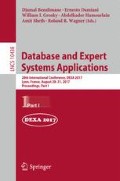Abstract
Given two data sets of user preferences and product attributes in addition to a set of query products, the aggregate reverse rank (ARR) query returns top-k users who regard the given query products as the highest aggregate rank than other users.
In this paper, we reveal two limitations of the state-of-the-art solution to ARR query; that is, (a) It has poor efficiency when the distribution of the query set is dispersive. (b) It processes a lot of user data. To address these limitations, we develop a cluster-and-process method and a sophisticated indexing strategy. From the theoretical analysis of the results and experimental comparisons, we conclude that our proposals have superior performance.
Access this chapter
Tax calculation will be finalised at checkout
Purchases are for personal use only
Notes
- 1.
Without loss of generality, we assume that the minimum values are preferable.
References
Dong, Y., Chen, H., Furuse, K., Kitagawa, H.: Aggregate reverse rank queries. In: Hartmann, S., Ma, H. (eds.) DEXA 2016. LNCS, vol. 9828, pp. 87–101. Springer, Cham (2016). doi:10.1007/978-3-319-44406-2_8
Dong, Y., Chen, H., Yu, J.X., Furuse, K., Kitagawa, H.: Grid-index algorithm for reverse rank queries. In: Proceedings of the 20th International Conference on Extending Database Technology, EDBT 2017, Venice, Italy, 21–24 March 2017, pp. 306–317 (2017)
Ram, P., Gray, A.G.: Maximum inner-product search using cone trees. In: The 18th ACM SIGKDD International Conference on Knowledge Discovery and Data Mining, KDD 2012, Beijing, China, 12–16 August 2012, pp. 931–939 (2012)
Vlachou, A., Doulkeridis, C., Kotidis, Y.: Branch-and-bound algorithm for reverse top-k queries. In: SIGMOD Conference, pp. 481–492 (2013)
Zhang, Z., Jin, C., Kang, Q.: Reverse k-ranks query. PVLDB 7(10), 785–796 (2014)
Acknowledgement
This research was partly supported by the program “Research and Development on Real World Big Data Integration and Analysis” of RIKEN, Japan.
Author information
Authors and Affiliations
Corresponding author
Editor information
Editors and Affiliations
Rights and permissions
Copyright information
© 2017 Springer International Publishing AG
About this paper
Cite this paper
Dong, Y., Chen, H., Furuse, K., Kitagawa, H. (2017). Efficient Processing of Aggregate Reverse Rank Queries. In: Benslimane, D., Damiani, E., Grosky, W., Hameurlain, A., Sheth, A., Wagner, R. (eds) Database and Expert Systems Applications. DEXA 2017. Lecture Notes in Computer Science(), vol 10438. Springer, Cham. https://doi.org/10.1007/978-3-319-64468-4_12
Download citation
DOI: https://doi.org/10.1007/978-3-319-64468-4_12
Published:
Publisher Name: Springer, Cham
Print ISBN: 978-3-319-64467-7
Online ISBN: 978-3-319-64468-4
eBook Packages: Computer ScienceComputer Science (R0)

